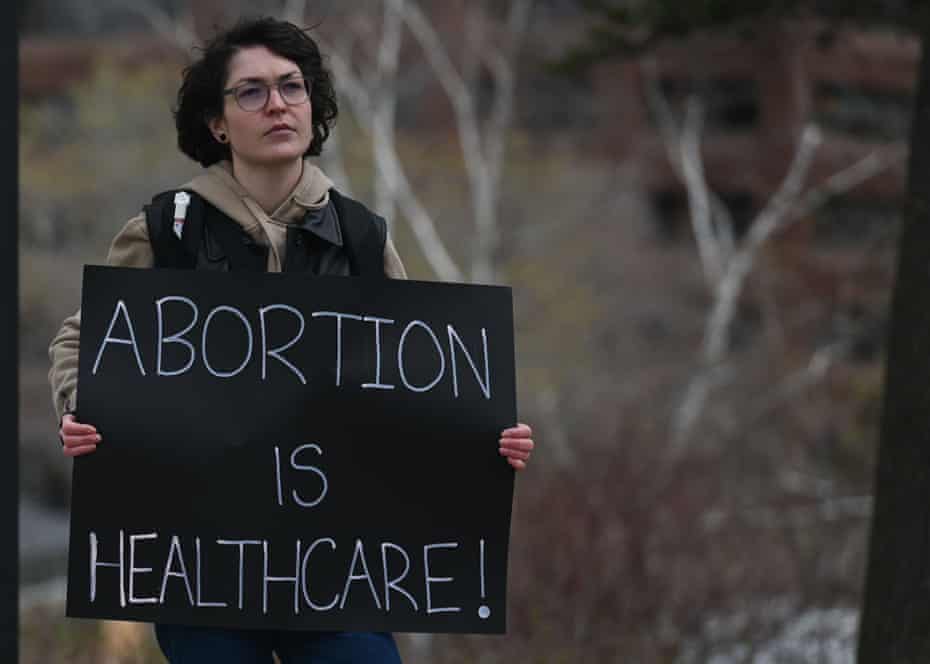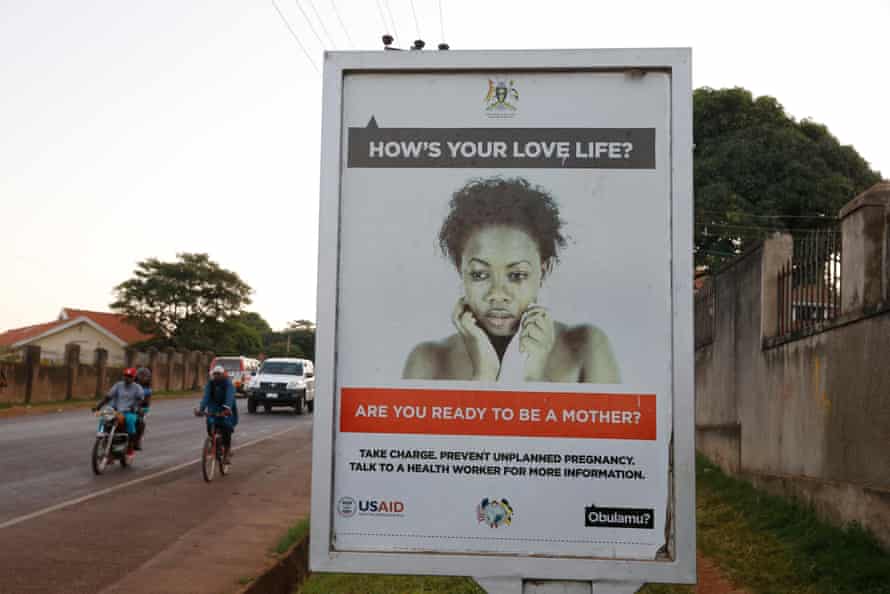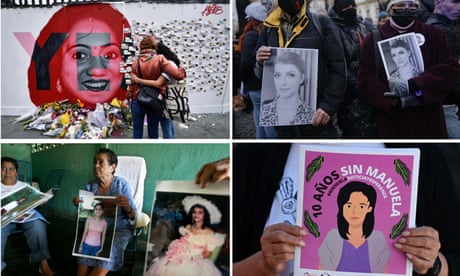If Roe v Wade is overturned, it will encourage anti-choice groups – particularly in the developing world, activists warn
GLOBAL PENTACOSTALISM


A pro-choice activist in Alberta, Canada, protests in solidarity with women in the US after the supreme court’s opinion was leaked.
Wed 18 May 2022 07.00 BST
The probable demise of abortion as a federal right in the US will be a “catastrophe” for women in low and middle-income countries, with an emboldened anti-choice movement likely to raise renewed pressure on hard-won gains, doctors and activists have warned.
The leak this month of the US supreme court’s draft majority opinion, which argued that the 1973 ruling effectively legalising abortion had been “egregiously wrong from the start”, stunned and enraged many in America.
But those shock waves did not stop at the borders of the US, as pro-choice figures around the world – many in countries with restrictive abortion laws and high levels of social stigma around reproductive rights – warned that Justice Samuel Alito’s words would “send a really clear message” of inspiration to anti-choice groups.
“I’m sure the pro-life or anti-choice movement in [Uganda] must be hoping and praying that the Roe v Wade legislation be overturned. I’m sure if that succeeds, it will be the biggest achievement the anti-choice movement [has] registered. I’m sure they will use it significantly to counter the work and the gains we thought we had registered,” said Kenneth Buyinza, a Kampala-based doctor.
Abortion in Uganda is legal in certain circumstances but highly restricted and dogged by stigma and misinformation. A ministry of health report in 2010 attributed about 8% of the country’s maternal deaths to unsafe abortion.
It is far from the only country in sub-Saharan Africa to see a strong link between stubbornly high levels of maternal mortality and unsafe abortions carried out by unlicensed practitioners, often in unsanitary conditions and without the proper equipment.
In such countries, the potential for the US move to encourage anti-choice politicians, judges and activists and further hold back abortion rights could not be more worrying.
“If Roe v Wade is reversed it would be a victory for anti-choice groups who finance the opposition in Africa and a catastrophe for us. It could influence policymakers and mean that in Africa we will keep seeing women dying. Whatever we have gained could be lost,” said Abebe Shibru, Ethiopia country director for MSI Reproductive Choices.
Another region where Alito’s words have caused alarm is Central America, where three countries have total bans on abortion: El Salvador, Honduras and Nicaragua. In another, Guatemala, lawmakers recently increased prison sentences for women found to have had an abortion, legal only if the mother’s life is at risk.
Advertisement
Eugenia López Uribe, regional director for the International Planned Parenthood Federation, warned the US move would inspire anti-choice policymakers in countries such as Guatemala.
“They can see that if they change the laws and they go against women’s rights, they can do it without any consequence,” she said. “The sign they are giving now is that women’s rights can be on the table for negotiations. So this is very worrisome.”

The probable demise of abortion as a federal right in the US will be a “catastrophe” for women in low and middle-income countries, with an emboldened anti-choice movement likely to raise renewed pressure on hard-won gains, doctors and activists have warned.
The leak this month of the US supreme court’s draft majority opinion, which argued that the 1973 ruling effectively legalising abortion had been “egregiously wrong from the start”, stunned and enraged many in America.
But those shock waves did not stop at the borders of the US, as pro-choice figures around the world – many in countries with restrictive abortion laws and high levels of social stigma around reproductive rights – warned that Justice Samuel Alito’s words would “send a really clear message” of inspiration to anti-choice groups.
“I’m sure the pro-life or anti-choice movement in [Uganda] must be hoping and praying that the Roe v Wade legislation be overturned. I’m sure if that succeeds, it will be the biggest achievement the anti-choice movement [has] registered. I’m sure they will use it significantly to counter the work and the gains we thought we had registered,” said Kenneth Buyinza, a Kampala-based doctor.
Abortion in Uganda is legal in certain circumstances but highly restricted and dogged by stigma and misinformation. A ministry of health report in 2010 attributed about 8% of the country’s maternal deaths to unsafe abortion.
It is far from the only country in sub-Saharan Africa to see a strong link between stubbornly high levels of maternal mortality and unsafe abortions carried out by unlicensed practitioners, often in unsanitary conditions and without the proper equipment.
In such countries, the potential for the US move to encourage anti-choice politicians, judges and activists and further hold back abortion rights could not be more worrying.
“If Roe v Wade is reversed it would be a victory for anti-choice groups who finance the opposition in Africa and a catastrophe for us. It could influence policymakers and mean that in Africa we will keep seeing women dying. Whatever we have gained could be lost,” said Abebe Shibru, Ethiopia country director for MSI Reproductive Choices.
Another region where Alito’s words have caused alarm is Central America, where three countries have total bans on abortion: El Salvador, Honduras and Nicaragua. In another, Guatemala, lawmakers recently increased prison sentences for women found to have had an abortion, legal only if the mother’s life is at risk.
Advertisement
Eugenia López Uribe, regional director for the International Planned Parenthood Federation, warned the US move would inspire anti-choice policymakers in countries such as Guatemala.
“They can see that if they change the laws and they go against women’s rights, they can do it without any consequence,” she said. “The sign they are giving now is that women’s rights can be on the table for negotiations. So this is very worrisome.”

An unplanned pregnancy information poster in Kampala, Uganda. Campaigners fear a chilling effect on African governments’ funding for family planning services. Photograph: Bsip Sa/Alamy
Sarah Shaw, head of advocacy at MSI, said the potential for legislative backsliding was clear. “A lot of the countries in which we work that have less restrictive abortion laws are probably a little bit ahead of where the country is socially. So they are very, very fragile. So it’s not going to take much to undermine them, overturn them,” she said.
In recent years US funding has been essential to the anti-choice movement globally, and Shaw said she feared the overturning of Roe would prompt a surge in the flow of money. In countries where corruption is rife and political systems are vulnerable to “dark money” lobbying, the impact could be sizeable.
The other major concern was that in countries heavily dependent on US aid for public health programmes the move could have a “chilling effect” on African governments’ commitment to abortion provision and other reproductive rights, making them “think twice about what they spend money on”, said Shaw.

Killed by abortion laws: five women whose stories we must never forget
“If there’s a chilling on prioritisation and funding for services that are already massively deprioritised and massively underfunded it’s going to be catastrophic,” she added.
Buyinza, who also works at the Uganda family planning consortium, said he worried the move could affect “fundraising and resource allocations to maternal and child health interventions”. He added that in Uganda – perhaps as in the US – anti-choice forces would be unlikely to stop at abortion, broadening their attacks on other areas such as LGBT+ rights.
“[By] taking this kind of action, [the US] is actually holding the flag very high now for countries that are still struggling with human rights issues, like, for instance, Uganda, but many other countries. There is no doubt that having this legislation overturned is going to have a significant bearing, [and] most likely it is going to be negative,” he said.
In his draft opinion laying out why Roe should fall, Alito concluded that the right to abortion was “not deeply rooted in the nation’s history and traditions”. Such reasoning was deeply problematic, warned Buyinza.
“Someone might be looking at abortion rights in isolation, but … there are so many things that are not … rooted in Ugandan and African ‘traditions and history’. And that goes beyond just abortion rights,” he added.
Sarah Shaw, head of advocacy at MSI, said the potential for legislative backsliding was clear. “A lot of the countries in which we work that have less restrictive abortion laws are probably a little bit ahead of where the country is socially. So they are very, very fragile. So it’s not going to take much to undermine them, overturn them,” she said.
In recent years US funding has been essential to the anti-choice movement globally, and Shaw said she feared the overturning of Roe would prompt a surge in the flow of money. In countries where corruption is rife and political systems are vulnerable to “dark money” lobbying, the impact could be sizeable.
The other major concern was that in countries heavily dependent on US aid for public health programmes the move could have a “chilling effect” on African governments’ commitment to abortion provision and other reproductive rights, making them “think twice about what they spend money on”, said Shaw.

Killed by abortion laws: five women whose stories we must never forget
“If there’s a chilling on prioritisation and funding for services that are already massively deprioritised and massively underfunded it’s going to be catastrophic,” she added.
Buyinza, who also works at the Uganda family planning consortium, said he worried the move could affect “fundraising and resource allocations to maternal and child health interventions”. He added that in Uganda – perhaps as in the US – anti-choice forces would be unlikely to stop at abortion, broadening their attacks on other areas such as LGBT+ rights.
“[By] taking this kind of action, [the US] is actually holding the flag very high now for countries that are still struggling with human rights issues, like, for instance, Uganda, but many other countries. There is no doubt that having this legislation overturned is going to have a significant bearing, [and] most likely it is going to be negative,” he said.
In his draft opinion laying out why Roe should fall, Alito concluded that the right to abortion was “not deeply rooted in the nation’s history and traditions”. Such reasoning was deeply problematic, warned Buyinza.
“Someone might be looking at abortion rights in isolation, but … there are so many things that are not … rooted in Ugandan and African ‘traditions and history’. And that goes beyond just abortion rights,” he added.


